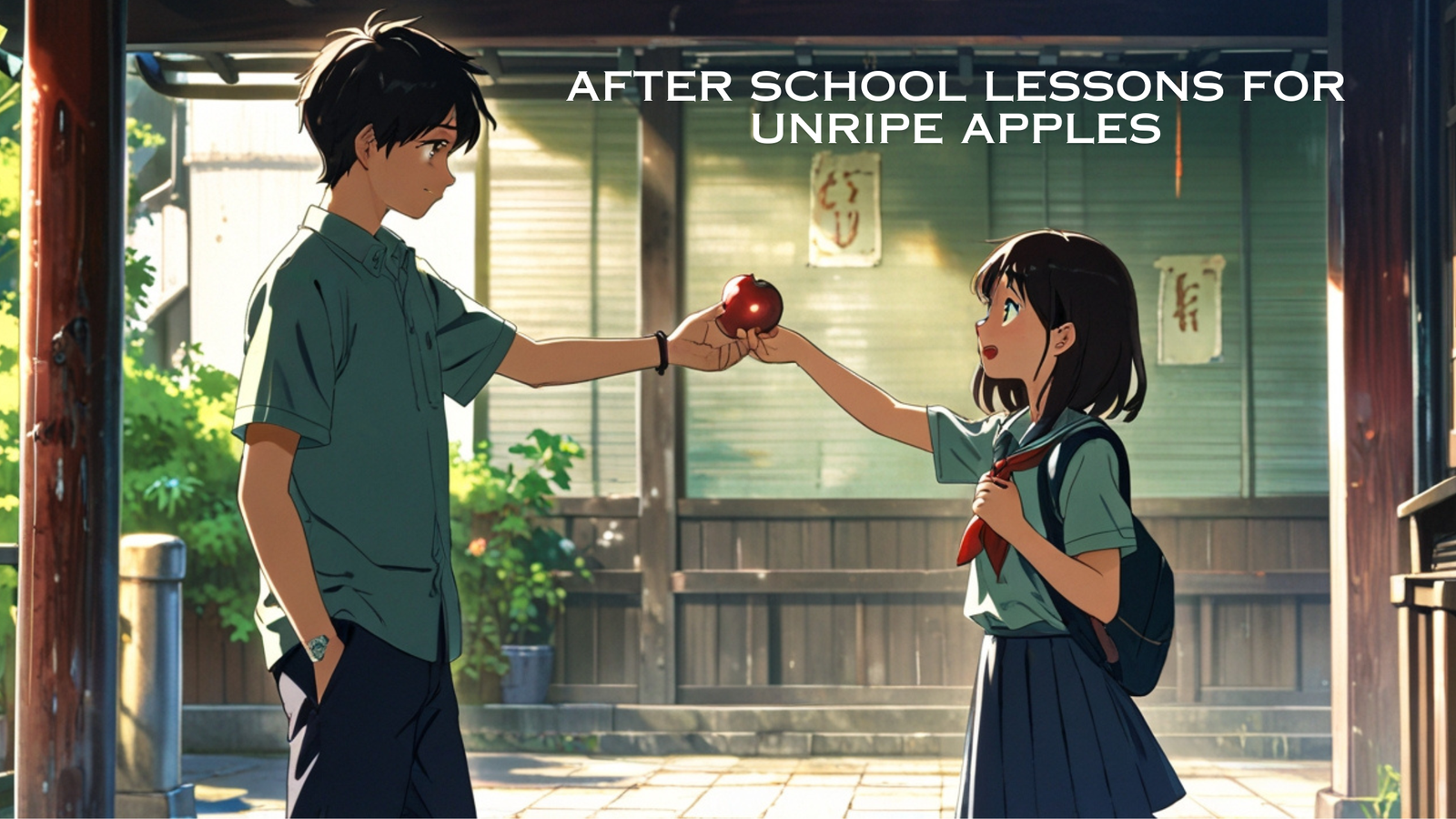After School Lessons for Unripe Apples: A Dive into the Story
Introduction
In the vibrant world of After School Lessons for Unripe Apples, we meet Kim Cheol, a transfer student navigating the ups and downs of middle school life. This series captures the essence of youth, relationships, and the challenges of growing up, all wrapped in a humorous and heartfelt package.
Introducing Kim Cheol
Kim Cheol is different from your average student. At 16 years old, he stands tall, which often leads to misunderstandings about his character. His height makes him tower over his classmates, and he’s frequently mistaken for a tough guy or even a gangster. This misconception is highlighted in After School Lessons for Unripe Apples when two men mistake him for trouble in Episode 26. It’s a classic case of first impressions gone wrong!
Despite his fierce appearance, Kim Cheol is a softy at heart. His friends, especially Mi-ae, play a crucial role in helping him navigate his social life. She often reminds him to smile more, turning that intimidating resting face into a friendlier one. In After School Lessons for Unripe Apples, appearances can be deceiving.
The Setting: Baekje Middle School
Baekje Middle School is the bustling hub for the After School Lessons for Unripe Apples events. It’s a place filled with teenage drama, friendships, and awkward adolescent moments. The mix of quirky students and strict teachers creates a relatable environment for anyone who has survived middle school.
As Cheol navigates his way through Baekje, he faces academic challenges and the complex social structures of middle school life. Cheol’s journey reflects the experiences we all remember fondly—or perhaps cringe at —from trying to fit in and dealing with crushes!
Misunderstandings and Mishaps
One of the recurring themes in After School Lessons for Unripe Apples is the misunderstandings that arise from Cheol’s intimidating presence. His classmates often jump to conclusions, believing he’s angry or upset when deep in thought. In Episode 3, the entire class is terrified of him for no reason.
Imagine Cheol quietly contemplating math homework while whispers circulate about his sinister intentions. Spoiler alert: he’s just trying to remember if he left his lunch at home! The humor stemming from these misunderstandings adds a light-hearted touch to the narrative, making it easy for viewers to connect with the characters.
The Friendship Dynamic
Friendship is at the heart of After School Lessons for Unripe Apples. Cheol’s relationships with Mi-ae and his other friends highlight the importance of support and understanding. Mi-ae encourages him to loosen up, reminding him that humor can break the ice in even the most awkward situations.
Their dynamic is filled with funny banter and genuine moments. It’s not just about the laughter; it’s about the lessons learned along the way. Cheol discovers that true friends see beyond the surface and help each other grow.
The Humor of Growing Up
The series expertly combines humor with serious themes. The struggles of adolescence are universal, and After School Lessons for Unripe Apples does a fantastic job of addressing them while keeping things light. Cheol’s encounters with gym teachers and misunderstandings in sports add a comedic twist that keeps viewers engaged.
In Episode 58, a gym teacher wrongly accuses Cheol of hitting Mi-ae during a game. The ensuing chaos is funny and relatable, showcasing teens’ challenges. These moments remind us that growing up is not just about serious lessons; it’s also about laughter and fun.
The Role of Appearances
In After School Lessons for Unripe Apples, appearances play a significant role in shaping the narrative. Cheol’s height and intimidating features often lead to misconceptions about his character. He’s frequently mistaken for someone he’s not, which opens the door to comedic situations.
For instance, there’s a scene where a flasher is scared off just by the sight of Cheol. It’s a humorous yet exaggerated way to highlight how looks can be deceiving. The series cleverly uses this theme to show that while first impressions matter, they don’t define who a person is.
Dealing with Crushes
Crushes are a natural part of growing up, and Cheol’s experiences in this realm are both funny and touching. His interactions with girls, particularly Mi-ae, showcase the awkwardness of first love. From shy glances to stammered compliments, these moments are all too familiar to anyone who has been a teenager.
In Episode 78, a girl attempts to flirt with Cheol, leading to an awkward yet hilarious exchange. It’s a reminder that navigating relationships can be challenging but also filled with laughter and learning.
The Importance of Self-Discovery
As the series progresses, Cheol embarks on a journey of self-discovery. He learns to embrace his strengths and weaknesses, a crucial part of growing up. The lessons he learns in After School Lessons for Unripe Apples aren’t just about fitting in but about being true to oneself.
This theme resonates with viewers of all ages. It reminds us that everyone struggles with their identity and that it’s okay to be a little “unripe” at times. Cheol’s growth inspires us to embrace our uniqueness.
The Humor in Awkward Situations
Awkward moments are a staple of After School Lessons for Unripe Apples. Whether it’s an embarrassing encounter with a teacher or a mix-up in class, these situations add to the series’ charm. Cheol’s misadventures often lead to laughter, showcasing the beauty of imperfection.
For instance, there’s a hilarious episode where Cheol accidentally spills juice on himself during lunch. The chaos that follows is relatable and amusing, reminding us that we’ve had our fair share of clumsy moments.
Lessons Learned
Through the lens of humor and friendship, After School Lessons for Unripe Apples imparts valuable lessons about empathy, understanding, and personal growth. Cheol’s journey teaches us that it’s essential to look beyond appearances and understand a person’s heart.
The series emphasizes the importance of kindness and support, particularly during the tumultuous years of adolescence. These themes resonate deeply, reminding us that every “unripe apple” has the potential to become something great with the right care and understanding.
Navigating Family Dynamics
Family plays a significant role in shaping Cheol’s character. His interactions with his little sister, Hwani, provide humor and depth. Their sibling dynamic is relatable, filled with playful teasing and genuine support.
In Episode 67, Hwani affectionately describes Cheol as “like a bear.” This playful comment highlights his protective and caring nature, especially toward his family. These moments ground the story and add layers to Cheol’s character.
The Power of Humor
The humor in After School Lessons for Unripe Apples makes it truly special. Laughter serves as a coping mechanism for the characters and the audience, lightening the weight of serious issues and making them easier to digest.
Cheol’s attempt to help a friend in one memorable scene leads to a series of comical misunderstandings. The chain reaction of events is hilarious and heartwarming, showcasing the power of humor in connecting people.
Conclusion
In conclusion, After School Lessons for Unripe Apples is a delightful exploration of adolescence, friendship, and self-discovery. Through Kim Cheol’s lens, we learn valuable lessons about acceptance, humor, and the importance of understanding one another. The series captures the essence of growing up with laughter and heart, reminding us that being a little unripe is okay.
As Cheol and his friends navigate the trials of middle school, they teach us that life’s journey is filled with twists, turns, and laughs. So, the next time you find yourself in an awkward situation or facing a misunderstanding, just remember After School Lessons for Unripe Apples—because sometimes, being a little unripe can lead to the sweetest fruit of all.














Post Comment